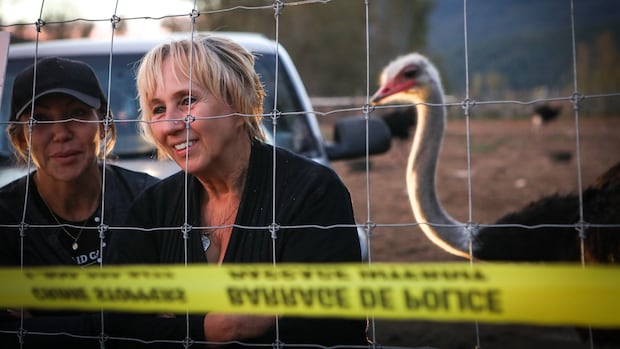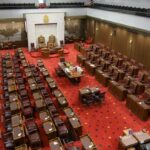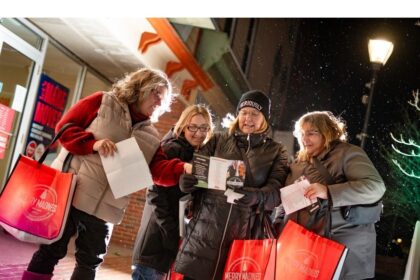IndigenousFirst Nations in B.C. are now among national and international voices that have been pulled into a fight to spare over 300 ostriches in the rural community of Edgewood, east of Kelowna, from a Canada Food Inspection Agency (CFIA) cull.Okanagan Nation Alliance says it has no stance on the cull, is focused on protection of native speciesEdzi’u Loverin · CBC News · Posted: Oct 06, 2025 7:13 PM EDT | Last Updated: October 8Karen Espersen, centre, the co-owner of Universal Ostrich Farms, speaks with supporters with her daughter, Katie Pasitney, at the farm in Edgewood, B.C., on Sept. 22. The Supreme Court granted a temporary stay of the cull Sept. 24. (Aaron Hemens/The Canadian Press)First Nations in B.C. are now among national and international voices that have been pulled into a fight to spare over 300 ostriches in the rural community of Edgewood, east of Kelowna, from a Canada Food Inspection Agency (CFIA) cull.Universal Ostrich Farms suffered an avian flu outbreak last December, which killed 69 of the farm’s ostriches. CFIA protocol follows a World Organization for Animal Health policy that requires all animals in a flock to be destroyed if H5N1 shows up in one bird.The farm, co-owned by David Bilinski and Karen Espersen, has been fighting the cull order in court, gathering a large body of supporters, including some involved with the Freedom Convoy movement, who see the order as government overreach.The farm claims First Nations in B.C. are helping to block the cull, including a cease and desist letter the farm says was written by a First Nation, but questions remain around how First Nations are involved.Cease and desist letterIn a Sept. 24 live video shared to the Universal Ostrich Farm Facebook page, the farm’s spokesperson Katie Pasitney can be seen handing RCMP a piece of paper she says is a cease and desist letter from a “signatory Indian tribe” that orders protection for the ostriches and the farmers’ land.RCMP did not respond to requests for comment.CBC Indigenous asked Pasitney who sent the cease and desist letter.”The signatory tribe, the Syilx and signatory tribe are the ones who wrote the cease and desist letter and we’ve been following up,” said Pasitney.Pasitney said she asked First Nations for help because she wants all the help she can get to save her ostriches.”And the Indigenous community is so powerful in their voice about preserving life. And these animals hold medicine,” said Pasitney.”Any lead that comes in of a tribe of a band, we’ve taken everything seriously, because we are just hoping that one of those are absolutely real, and could come forward.”First Nations focus on health of native speciesUniversal Ostrich Farms is in the traditional territory of the Syilx people, who are under the umbrella of the Okanagan Nation Alliance, comprising the Okanagan Indian Band, Upper Nicola Band, Westbank First Nation, Penticton Indian Band, Osoyoos Indian Band and Lower and Upper Similkameen Indian Bands (and the Colville Confederated Tribes in the U.S. on areas of common concern.)A Sept. 25 statement by the Okanagan Nation Alliance said the Syilx Nation does not take a position on the cull.”As Syilx people, our collective mandate remains to uphold our responsibilities to the land, waters, and the native species that belong to our territory,” said the statement.”We emphasize that our focus is on the health and protection of native species in Syilx Okanagan territory.”A spokesperson for Okanagan Nation Alliance said neither Westbank First Nation nor Chief Robert Louie have issued any letters or statements on this issue.A statement by the Union of B.C. Indian Chiefs on Sept. 24 said it is deeply concerned with the ostrich farm cull but “acknowledges the need for euthanasia in certain disease-control situations such as this one.””UBCIC is aware that local First Nations have not been consulted or engaged in decision making … Any culling must be carried out humanely and with minimal suffering,” the statement said.Some Indigenous people online have supported the farmers, but other community members in the region say calls for First Nations support are upsetting.”It’s kind of infuriating, insulting, aggravating that these people are calling for our support when they would not ever support our our own rights until it can benefit their own agenda,” said Stephanie Lindley, from the Upper Nicola Band.Stephanie Lindley says a post on Universal Ostrich Farm’s Facebook page that showed two women wearing white headbands with the names ‘pecking bird’ and ‘standing ostrich’ mocked First Nations culture. (Submitted by Stephanie Lindley)Lindley said many people she knows have pulled their support for the farmers after posts shared to the farm’s Facebook page on Sept. 24 showed racist and appropriative attitudes by the farm’s supporters.A screenshot of one post shared to the farm’s page that has since been deleted showed two women wearing white headbands with the words “pecking bird” and “standing ostrich.””They had given themselves Indian names and they were mocking Indigenous culture and they had some really offensive Indian names written on the headband,” said Lindley.Mark Thomas, a councillor for the Shuswap Band, which is part of the Secwepmec Nation, said anyone bringing exotic species into someone’s land should ask first.”You should not be bringing exotic species into our lands. That’s my perspective right there from a leader,” said Thomas.”If you want to come in and do things, whether that be anything, whether that be plants, animals, anything, any type of organism, you should not be bringing into a land that it isn’t born from.”ABOUT THE AUTHOREdzi’u Loverin is graduate of CBC’s Indigenous Pathways Program and has reported in Vancouver and Winnipeg since 2024. Edzi’u is a member of the Taku River Tlingit First Nation and a registered member of the Tahltan Nation, but is currently based in xʷməθkʷəy̓əm, Sḵwx̱wú7mesh, and səlilwətaɬ territories. You can email Edzi’u at edziu.loverin@cbc.ca with story ideas.
Thursday, 5 Mar 2026
Canada – The Illusion
Search
Have an existing account?
Sign In
© 2022 Foxiz News Network. Ruby Design Company. All Rights Reserved.
You May also Like
- More News:
- history
- Standing Bear Network
- John Gonzalez
- ᐊᔭᐦᑊ ayahp — It happened
- Creation
- Beneath the Water
- Olympic gold medal
- Jim Thorpe
- type O blood
- the bringer of life
- Raven
- Wás’agi
- NoiseCat
- 'Sugarcane'
- The rivers still sing
- ᑲᓂᐸᐏᐟ ᒪᐢᑿ
- ᐅᑳᐤ okâw — We remember
- ᐊᓂᓈᐯᐃᐧᐣ aninâpêwin — Truth
- This is what it means to be human.
- Nokoma











